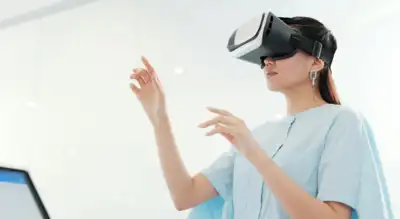
UAE-based startup X-Technology, develops a virtual reality therapy for cancer survivors.
For many cancer patients, the hardest battle begins once treatment ends. While physical pain may lessen, the psychological impact, the fear, anxiety, and loss of direction often lingers much longer.
A UAE-based startup, X-Technology, is pioneering a novel form of emotional support using virtual reality (VR) technology to help patients confront these challenges.
Healing Beyond the Diagnosis
In an exclusive interview with local news outlet, KT, Nargiz Noimann-Zander, founder of X-Technology, explained, “We don't work with cancer, we work with the psyche. We don’t treat the diagnosis. We help with what the diagnosis does to a person’s emotional state.”
Through immersive VR exercises, users are invited to externalize and face their fears in a controlled, virtual environment.David, CTO of X-Technology and Nargiz’s son, further described one of the key VR exercises: “You need to try to hold the fear inside each sphere and make them come closer. When they come close, you see a flow. That means you’re on the right track. It’s all mind-driven.” In this exercise, the user places the same fear into two spheres floating in a galactic space and focuses on merging them until they explode in virtual stardust, symbolizing emotional release.
A Long Journey of Innovation in Psychotechnology
Nargiz has spent over 25 years blending psychology, neuroscience, and technology. Speaking to KT, she shared how her work began out of personal necessity: “One of my sons had serious heart issues when he was a child, and that’s when I started looking into using computer games as a gentle way to support healing.”Her early efforts led to the founding of the Health Centre in 1997, a collaborative space where doctors, psychologists, and neuroscientists sought gentle, science-backed healing methods.
Between 1999 and 2003, her team focused on biofeedback to understand psychophysiological states, before developing game-based emotional support tools between 2003 and 2009. “On modest Pentium systems, we built the very first prototypes of game-based interventions,” Nargiz told KT.From 2009 to 2017, these tools evolved by integrating biofeedback and real patient input, culminating in the adoption of VR technology in 2017.
By 2019, AI, virtual assistants, and digital twins were added to the platform. Today, X-Technology’s system is used worldwide in clinics, educational institutions, and corporate wellness programs. David emphasized to KT their strict data privacy approach: “We’re very worried about the data.
We don’t connect to Wi-Fi or the cloud. Everything is stored offline inside the headset. I don't want anybody to know what's happening in my brain.”
Scientific Support and Research on VR Therapy
Professor Sam Abuomar, Director of the Artificial Intelligence Master’s Programme at Lewis University and visiting professor at the American University of Sharjah, is leading a study evaluating the impact of X-Technology’s VR platform on patients recovering from cancer and those with chronic illnesses. He told KT, “The VR experience has a positive impact because it emulates certain emotional states or past experiences.
Especially for high-risk patients, those with conditions like cancer or undergoing chemotherapy, this type of immersive support can improve their emotional and psychological well-being.”Professor Abuomar’s research focuses on memory, emotion, and trauma processing. He explained that future system versions might tailor virtual environments to evoke comforting, familiar experiences, such as family settings or workplaces.
He added, “In our literature review, we came across about 15 studies conducted between 2020 and 2025. All of them showed promising results. For example, a 2023 Cleveland Clinic study on 52 cancer patients using interactive therapeutic VR reported significant reduction in depression.
Another European study in 2025 on surgical patients found a significant reduction in intraoperative pain.”Though still early, Abuomar and his students have begun pilot testing with 10 patients to compare traditional therapy with VR-based support.
“If this proves successful, it could be a big step for this kind of tech-based mental health intervention,” he said.
Real-Life Impact from Users
Maria Efimova, a clinical psychologist based in Moscow, shared her experience using the headset for over two years. In a conversation with KT, she said, “The benefits have been tremendous. I’ve seen a significant reduction in anxiety, fears of public speaking, and constant worrying. When I face health-related stress or even physical pain, this is the first thing I turn to.
It’s like having a coach on call.”Maria uses two main programs: one to dissolve fears and another to address body-related projections. “My mother uses them too. I often recommend it to my clients. Even after one session, I feel less tension and more calmness,” she said.
A Personal Mission to Restore Humanity in Healing
Nargiz Noimann-Zander’s mission extends beyond technology to restoring empathy and humanity in healing. She leads international research centers and has authored nine books. As a mother of eight and grandmother of three, she reflected in her interview with KT, “When future technologies meet a deep understanding of human consciousness, we access a whole new level of self-awareness and possibility.”Her goal is clear: “It’s not about fighting the disease. It’s about helping people face what it does to their mind and soul and giving them the tools to rise again,” she concluded.

 5 hours ago
46
5 hours ago
46




























 English (US)
English (US)